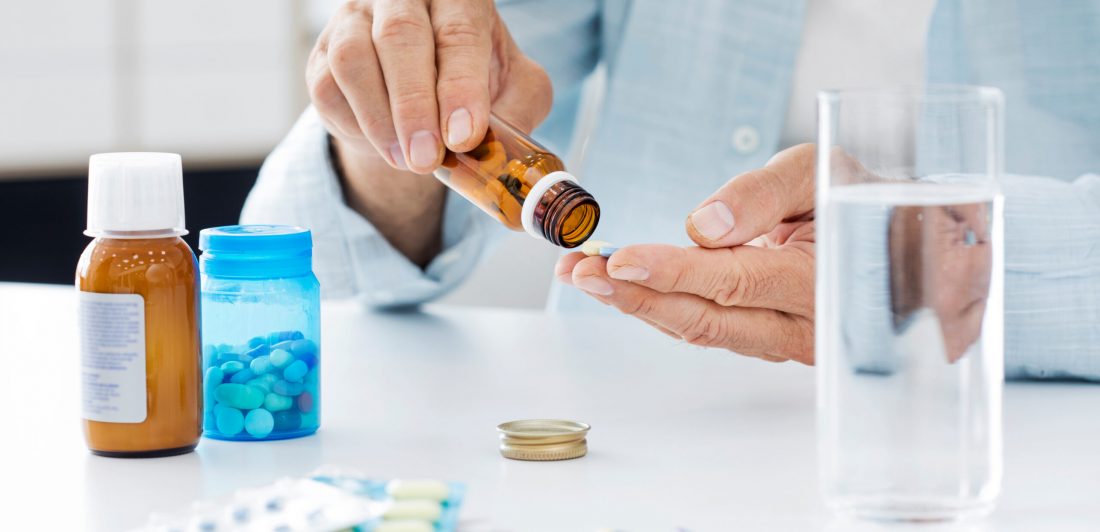If you’ve ever watched a commercial for a medication on TV, then you’re probably aware that most drugs, prescription or otherwise, can have negative side effects. The very thing that should help you feel better can actually make you feel worse. But how can you know if your illness is caused by your medication?
Four Ways Illness Can be Caused by Medication
There are several ways that illness may be caused by medication. While this list is by no means comprehensive, it may help give some insight as to why people can have negative reactions to medications.
Negative Side Effects
It’s no secret that medications can have adverse side effects. In fact, the FDA requires pharmaceutical companies to tell the public about possible negative side effects of medications. How detailed the companies have to be about the side effects depends on the type of advertisement.
Ads that appear in print must list all possible side effects, even if they are rare. Broadcasting ads, which use audio or video, are only required to list the most important risks. However, broadcasting ads that don’t list all side effects must also include information about where to find the full prescribing information of the medication.
Side effects can be relatively minor, including symptoms such as:
- Cough
- Trouble swallowing
- Dizziness
- Muscle cramps
- Diarrhea
- Skin blisters
However, side effects from medication can also be more severe, with serious issues like:
- Stroke
- Seizures
- Liver or kidney failure
- Blood clots
- Internal bleeding
- Cancer
All medications, whether they are prescribed by a doctor or sold over-the-counter, have the potential to cause negative side effects, especially if they are not used correctly. However, some medications are much more likely to cause harm than others. A few examples of higher-risk drugs are:
- High-powered antibiotics, such as tobramycin and vancomycin
- Steroids, including prednisone and cortisol
- Anti-cancer drugs
Adverse Drug Events (ADEs)
An adverse drug event (ADE) occurs “when someone is harmed by a medicine,” according to the Centers for Disease Control and Prevention (CDC). Although ADEs are very similar to side effects, they are not the same thing. Side effects are documented and studied during clinical trials and drug development, so they are predictable. ADEs, however, are not predictable and are usually unique to a person, dose, or interaction. ADEs occur far less frequently than side effects.
The term adverse drug event is a broad term that can encompass many different kinds of negative medical events. Some ADEs are preventable; some are not. ADEs can occur when taking normal doses of medications, and they can also occur when taking doses that are lower or higher than what is recommended. In addition, a person could experience an ADE whether they use medication as directed or whether they use it inappropriately.
Because ADEs are unpredictable, there is no way to know if or when a person will experience an ADE. If you believe you have had an ADE due to a medication, it’s best to keep track of the event and tell your doctor or pharmacist as soon as possible.
Allergies
Another cause of adverse reactions to medications is allergies. According to the American Academy of Allergy Asthma & Immunology, about 5-10% of all negative reactions to medications are due to allergies. Allergic reactions after the first time taking the drug are usually not very dangerous. However, allergic reactions often get worse with every exposure.
If you think you’ve had an allergic reaction to your medication, it’s best to tell your doctor as soon as possible. Here are a few signs you may have had an allergic reaction:
- Rashes
- Itching
- Cough
- Nausea
- Vomiting
- Diarrhea
Drug Toxicity
Drug toxicity, the gradual buildup of medication in the bloodstream, can also cause negative health effects. There are a few reasons people may experience drug toxicity. The first reason is that the dose of medication a person is taking could be too high. Second, a person may experience drug toxicity if their ability to metabolize the drug changes over time. Finally, those who visit multiple doctors that do not communicate with each other may prescribe similar medications, which can build up to toxic levels.
Some medical experts suspect that drug toxicity contributes to many peoples’ medical issues. However, in many cases, drug toxicity goes undetected because doctors and patients may fail to consider it as the culprit of new symptoms. Some common symptoms of drug toxicity include:
- Mental disorientation
- Dizziness
- Blurred vision
- Memory loss
- Fainting
- Falls
If you believe you may be affected by drug toxicity, you should talk to your doctor immediately. In many cases, simply reducing the dose or eliminating the suspected drug can resolve the issue. The best way to avoid drug toxicity is to keep a record of the medications you take, including over-the-counter medicines, and take the list with you to see your doctor. Additionally, if new symptoms appear after taking a medication over a long period of time, ask your doctor about the possibility of drug toxicity.
Who is Most Likely to Suffer From Illnesses Caused by Medication?
There are two main factors that make a person more susceptible to illnesses caused by medication. The first is age. Medical experts believe that older people are more likely to experience negative side effects and may be more likely to suffer from drug toxicity. This is because the way the body functions changes as people age. Medications are metabolized by the kidneys and/or liver, which, unfortunately, tend not to function as well as a person ages.
The second factor that puts a person more at risk for illnesses caused by medication is taking multiple medications. The more medications a person takes, the greater chance they have of experiencing negative side effects, adverse drug events, and drug toxicity. Taking more than one medication can lead to what’s called a “prescribing cascade,” which happens when a person needs to take more and more medications to deal with the side effects from the other medications they already take. The more medications a person takes, the more likely they are to build up to toxic levels as the drugs interact with each other and the medications alter bodily functions.
What Should I Do If I Believe My Illness is Caused by My Medication?
Whether you are experiencing what you believe to be a negative side effect, adverse drug event, allergy, or drug toxicity, the best course of action is to tell your doctor as soon as possible. Do not stop taking the medication until your medical provider tells you it is safe to do so. Sometimes quitting a medication “cold turkey” can have negative effects.
If you are experiencing a negative side effect, there is a chance it may go away as your body adjusts to the medication. If you have a case of drug toxicity, then simply reducing the dose may help you feel better. Your doctor will help you decide what is best for you regardless of why your medication is making you feel sick.
It’s important to pay attention to your symptoms, especially when you begin taking a new medication. Doctors suggest writing down any symptoms you have and bringing your notes with you to your doctor’s appointments to help you make the best-informed decision.
How Can I Prevent Illnesses Caused by Medication?
While it’s impossible to totally prevent negative side effects or other issues with medication, there are some ways you can try to avoid potential problems.
1. Ask your doctor if a lifestyle change can be effective. Sometimes you can avoid taking medication by making lifestyle changes such as eating healthier and exercising more.
2. Tell your doctor what medications you currently take before they prescribe a new one. Ensuring that your doctor knows what drugs are already being taken can help prevent negative reactions with the medications you’re currently taking.
3. Ask your medical provider to tell you about the side effects of medication. It’s best for you to be informed about the possible side effects so that you can better monitor your reaction to the medication.
4. Ask these five questions when receiving a new prescription for medication.
- Why are you prescribing this drug?
- What are the main concerns with this drug?
- Are there any tests that could predict my response to this drug?
- How should I take this medication? With or without food?
- How is this drug eliminated by my body?
The Carlson Law Firm Can Help
Pharmaceutical companies are required by the FDA to warn consumers of the possibility of negative side effects. However, sometimes these companies fail to ensure that the information people need to make informed decisions is readily available.
If you have been a victim of a dangerous drug that caused negative effects to your health, we want to help you. Our dangerous drugs lawyers can help you get compensation for the injustice you have suffered. We assist clients nationwide, and we’re available 24/7. We care, and we can help.




